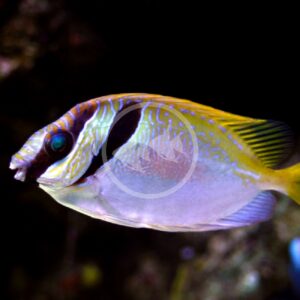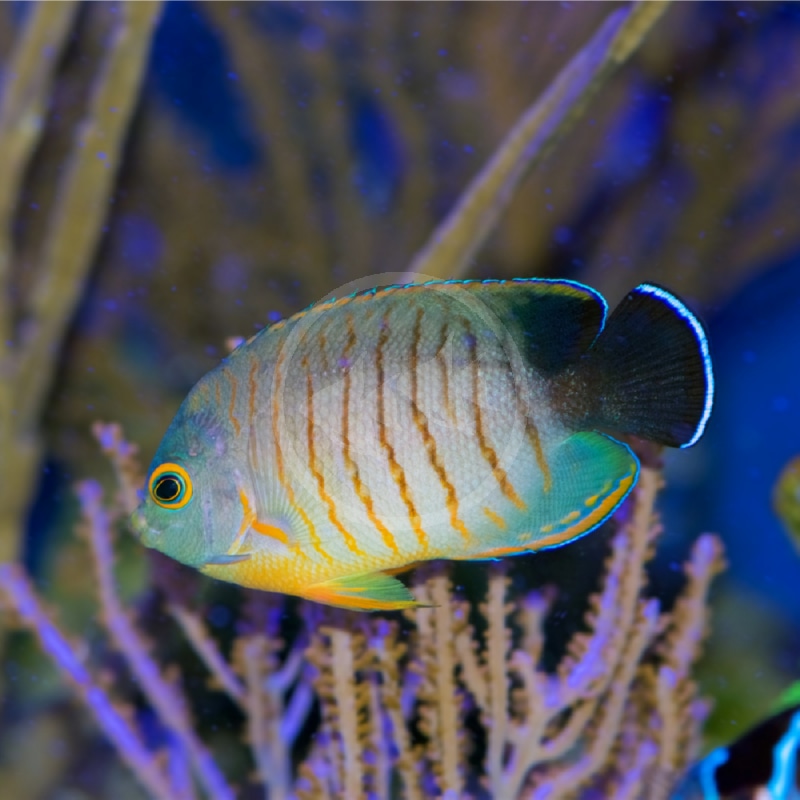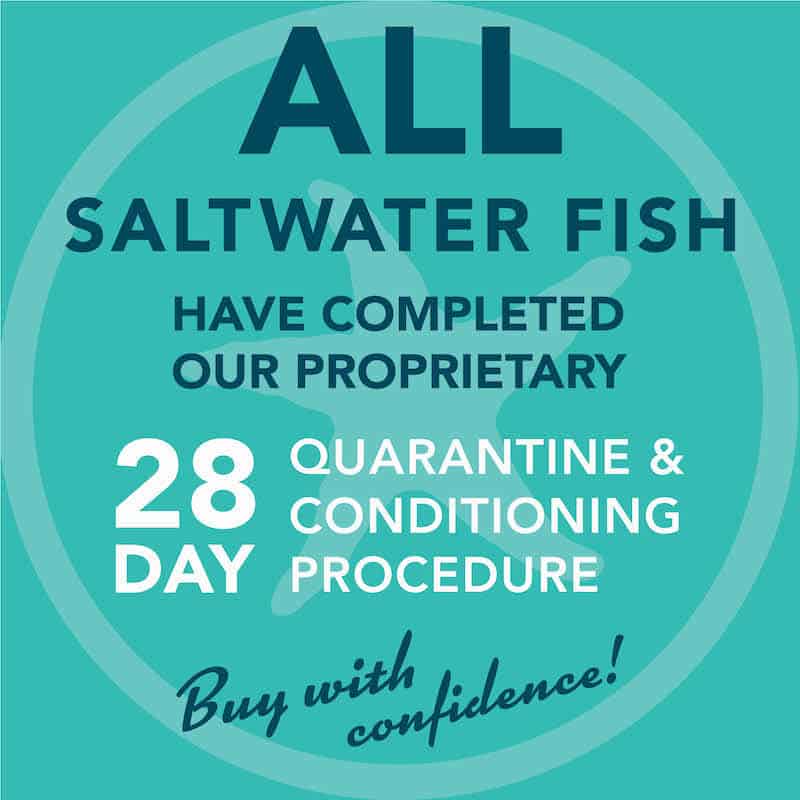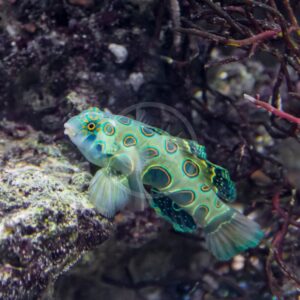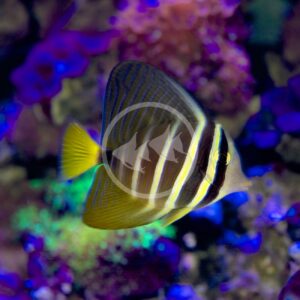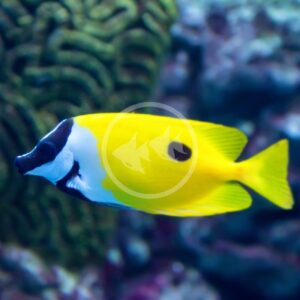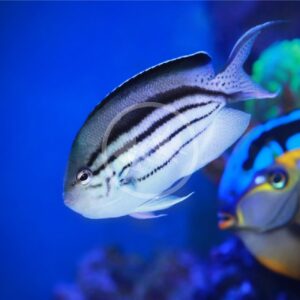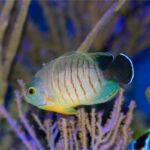

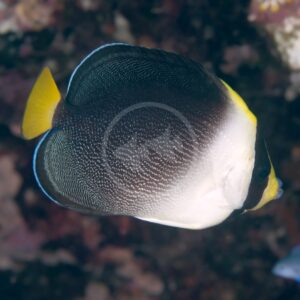
ANGEL DWARF – EIBLI / RED STRIPED Centropyge eibli
$119.99 – $139.99Price range: $119.99 through $139.99
The Eibli Angelfish, also known as the Eibl’s, Blacktail, or Red Stripe Angelfish, is found throughout the Indo-Pacific, Fiji, Australia and Indian Ocean. A hardy fish, its pearl-colored body with vertical orange stripes and black caudal fin outlined in a brilliant light blue makes the Eibli angel a gorgeous and unique addition to the saltwater aquarium. One of the larger species in the Centropyge genus, an adult Eibli angel can grow to approximately 6″. Note: All of our Eibli angels are selectively sourced from more sustainable locations.
Care Level: Easy
Temperament: Semi-Aggressive
Reef Compatible: With Caution
General Description: The Eibli Angelfish, also known as the Eibl’s, Blacktail, or Red Stripe Angelfish, is found throughout the Indo-Pacific, Fiji, Australia and Indian Ocean. A hardy fish, its pearl-colored body with vertical orange stripes and black caudal fin outlined in a brilliant light blue makes the Eibli angel a gorgeous and unique addition to the saltwater aquarium. One of the larger species in the Centropyge genus, an adult Eibli angel can grow to approximately 6″. Note: All of our Eibli angels are selectively sourced from more sustainable locations.
Diet Requirements: In the wild angelfish are omnivorous. A varied diet of high quality algae, proteins, pellets, flakes, and enriched frozen foods are important for best coloration, immune function and optimal health.
Care Requirements: An established minimum 75 gallon aquarium is ideal for an Eibli angel. This angelfish absolutely requires a set-up with live rock to graze algae and diatoms off of. Upon introduction, the Eibli angel can be quite shy and secretive but will become more courageous with time. While this angel is considered one of the least aggressive in the genus, the Eibli angel may still have territorial – aggressive conflicts with conspecifics (including other species within the genus) that are not introduced at the same time as it. If you want to house multiple types of angelfish together, it is best to add them all at once, or closely together at the very least, and as juvenile or sub-adult specimens (which are not nearly as territorial as adults) for the best chance of success. The Eibli angel is to be added “with caution” into a reef aquarium, as some individuals have been observed to nip certain large polyp stony (LPS) corals. Recommended water conditions, 72-78° F, KH 8-12, pH 8.1-8.4, salinity 1.020-1.025.
Purchase Size: Small: 1-1/2″ to 2″; Medium: 2″ to 3″; Large: 3″ to 4-1/2″
Note: Your item may not look identical to the image provided due to variation within species. Purchase sizes are approximate.
Dry goods orders are shipped via US Postal Service or UPS to the address provided at checkout based on the selection made in your website shopping cart. Product is carefully packed to help prevent any damage during shipping. Once processed you will receive a shipment notification via email with tracking number, and delivery notification. Please allow 48 hours for processing after your order is placed.
Perishable items (i.e. live plants, refrigerated/frozen foods) are shipped via US Postal Service 2-3 day to the address provided at checkout for a $25.00 flat rate charge. Items are packed with secure packing material and heat, cold, or Cryo packs as needed to maintain safe temperatures during transit. If one or more perishable items are in the shopping cart at checkout the $25.00 perishable shipping charge will automatically appear and need to be selected. Once processed you will receive a shipment notification via email with tracking number. Please allow 48 hours for processing after your order is placed.
Livestock (i.e. fish, invertebrates, coral) are shipped via UPS Overnight to the address provided at checkout for a $55.00 flat rate charge. Livestock is packed in insulated styrofoam boxes with secure packing material and heat, cold, or Cryo packs as needed to maintain safe temperatures during transit. If one or more livestock items are in the shopping cart at checkout the $55.00 livestock shipping charge will automatically appear and need to be selected. Livestock is shipped Monday through Wednesday ONLY (no weekend delivery is available) weather permitting, and we reserve the right to delay shipping until conditions are appropriate for safe arrival. Once your order is placed we will contact you to arrange the best shipping date based on these criteria. Someone must be available to receive the livestock order on the first delivery attempt. Once processed you will receive a shipment notification via email with tracking number. Please allow 48 hours for processing after your order is placed.
For mixed dry goods/perishable & livestock orders items will be shipped via their corresponding shipping methods outlined above. Dry goods will be shipped via US Postal Service or UPS based on your selection and checkout, while livestock will ship via UPS Overnight for a $55.00 flat rate charge. You will receive separate notifications and tracking numbers for the dry goods and livestock. Please note due to different carriers and shipping methods dry goods and livestock may arrive on different days.
Related products
TANG – SAILFIN Zebrasoma veliferum
$99.99 – $199.99Price range: $99.99 through $199.99RABBITFISH – ONE SPOT FOXFACE Siganus unimaculatus
$119.99 – $199.99Price range: $119.99 through $199.99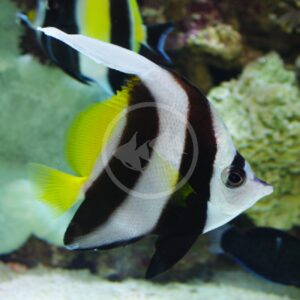

BUTTERFLY – HENIOCHUS BLACK & WHITE Heniochus acuminata
$159.99 – $249.99Price range: $159.99 through $249.99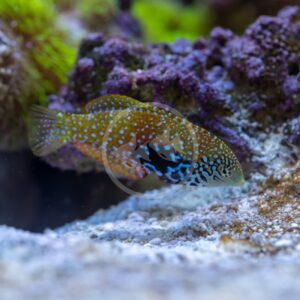

WRASSE – LEOPARD VERMICULATE Macropharyngodon bipartitus
$129.99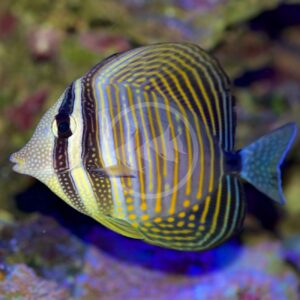

TANG – SAILFIN DESJARDINII Zebrasoma desjardinii
$169.99 – $199.99Price range: $169.99 through $199.99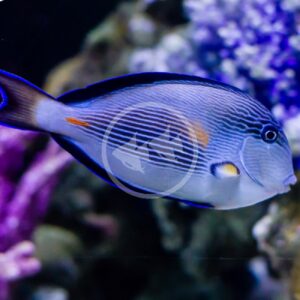

TANG – SOHAL Acanthurus sohal
$289.99 – $319.99Price range: $289.99 through $319.99